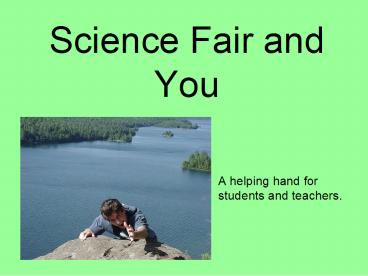Science Fair and You - PowerPoint PPT Presentation
1 / 16
Title:
Science Fair and You
Description:
1. Research shows that students learn and remember science better when they are ... tests, taste comparisons, sleep learning, memory retention, optical illusions. ... – PowerPoint PPT presentation
Number of Views:96
Avg rating:3.0/5.0
Title: Science Fair and You
1
Science Fair and You
A helping hand for students and teachers.
2
Why do science fair projects?
1. Research shows that students learn and
remember science better when they are engaged in
projects of their own design.
2. Science fairs give students opportunities to
win prizes such as scholarships, cash awards and
recognition.
3. Science fairs involve the community as
students look for mentors and help with their
projects.
4. A science fair can be fun, if students pick
topics of interest to them, plan ahead and use
the help that is available to them.
3
How to Get Started
Pick an area of science. These are the
possibilities 1. Behavior and Social Sciences
9. Gerontology 2. Biochemistry 10. Mathemat
ics 3. Botany 11. Medicine and Health 4. C
hemistry 12. Microbiology 5. Computer Scienc
e 13. Physics 6. Earth and Space Sciences 14.
Zoology 7. Engineering If you do not know wha
t 8. Environmental Science some of these are,
ask.
4
Narrow your topic down. Think about what you
already know. For example Topic Chemistry
Subtopic new chemical products
What I know In class, we mixed Elmers glue
with borax solution and got a new substance with
different properties. What I wonder What else,
when mixed with Elmers glue will make a useful
or new substance? What is in Elmers glue? How
could I find out? Are there any possible hazards?
YOU MUST HAVE A PARENT SIGNATURE ON YOUR
PROPOSAL, INDICATING THAT A PARENT KNOWS WHAT YOU
ARE DOING!!!
5
This video clip is from the movie October Sky.
Do not perform experiments like this without
adult supervision. Today, Homer would not be
allowed to compete in his local science fair
because he was not experimenting with an adult
present.
6
Continue to define your project by doing research
and talking to knowledgeable people (mentors)
A mentor can be a parent, relative, neighbor or
college student. University staff can help with
projects requiring equipment that is hazardous or
hard to find.
7
Homer found two mentors.
8
Some projects require a university setting. They
include the use of vertebrate animals,
controlled substances, tissue studies or
bacterial research. You may not do these
experiments at home. Projects not allowed at the
BYU fair 1. Any projects involving adding chem
icals of any kind to fish tanks or an animals
food or water. These can only be conducted at a
University setting. 2. Grow bacteria or fungi at
home. 3. Use human subjects without prior appro
val. Forms are available, all requests must be
screened by health professionals.
Topics to avoid growth of mold or crystals,
effect of music, liquids, light, smoke, or
talking to plants, teeth studies, consumer tests,
taste comparisons, sleep learning, memory
retention, optical illusions.
9
When you have turned in your paperwork and found
a mentor, it is time to begin.
All good science projects have a plan. It may i
nclude all or some of the following steps
Title, research, research question, hypothesis,
procedures, and data tables or log book. Many
experiment need a control to make comparisons.
Control
Test
10
Begin your experimentation. Remember that you
learn as much from failed experiments as from
those that work as you expected. Collect your
data and refine the experiment as needed.
11
Hard work and determination will pay off.
12
Analyze your data and draw accurate conclusions.
Graphs, charts, written summaries will help
others know what happened and why you think it
happened the way it did.
Many students fail to apply statistical methods
to their results. The size of your sample and
the number of tests you have done affects how
valid your results are. Surprise a math teacher
and ask them to help you with this analysis.
13
Make an attractive and informative display.
Include your written work, pictures, graphs, and
charts. You do not need to include your
equipment or be able to redo the experiment.
Pictures of the steps you took, the equipment and
the results are fine.
14
How does science fair competition work?
First, students compete with students from their
own school. Winners from the school fairs are
invited to the Jordan School District Fair.
Winners from this fair go to BYU or the
University of Utah to compete against other
students from local school districts in these
regional fair. Prizes awarded at these
competitions include cash and scholarships.
The winning students at Regional fairs are
awarded an all-expenses paid trip to Portland
Oregon to compete at the International Science
and Engineering Fair (ISEF) This week-long
experience was described by a graduate student at
the University of Utah as the best week of my
high school experience.
ISEF is May 7-12, 2003
15
Regional science fair competition (at the
University of Utah or BYU) involves bringing your
project to the fair and explaining it to a judge.
Jordan School District will provide buses to
get students to the fair. The Universities
provide other events for students to attend
during the fair day.
16
Homers project changed his life. He went on to
become a NASA scientist. Your project may not
change your life, but it will help you learn
valuable skills and gain experience and knowledge
in science.































